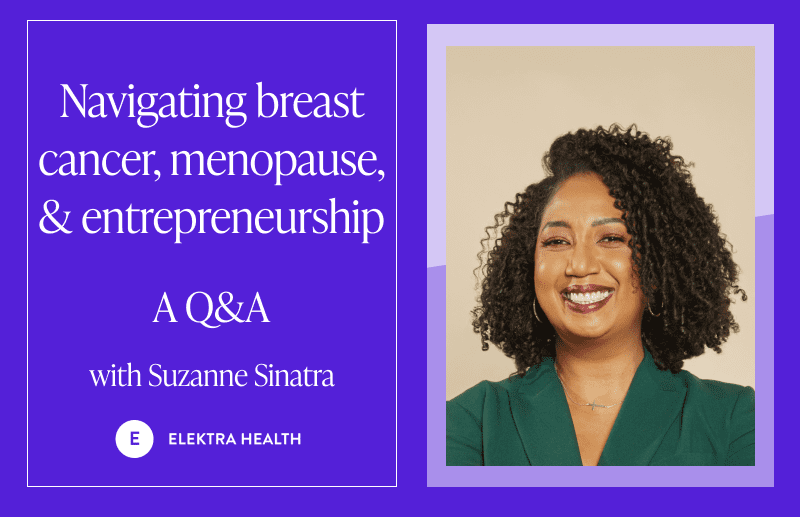
When Suzanne Sinatra started experiencing vaginal pain at 44 years old, menopause really wasn’t on the brain. In the throes of her third chemotherapy treatment for breast cancer, the Private Packs founder had little bandwidth to consider the myriad physical changes occurring in her body — and as it turns out, so did her medical team.
We chatted with Suzanne to learn more about her unusual menopause experience and how lack of support from the health care system led her to founding a first-of-its-kind vaginal care product company.
How did your breast cancer diagnosis and treatment impact your menopausal journey?
I was diagnosed in 2017 at 44 years old, so menopause wasn’t on my radar at all. I didn’t even know what perimenopause was! It just wasn’t something I was thinking about, and I wasn’t feeling any physical, emotional, or mental changes that might’ve pointed to it. My first oncologist, who was a woman, never explained anything about menopause, the stages, or what would happen to me. I didn’t ask either because, honestly, I was more focused on the cancer.
Then, one day, while I was walking through the hospital for my third chemotherapy treatment, my vulva started stinging. I was used to my thighs chafing, but this was much higher up, and it caught me off guard. When I got to the hospital, I asked my oncologist why my vagina was in so much pain. She flippantly replied, “You’re in menopause.” Confused, I said, “Yes, I know, but is that why?”
She explained that since my cancer was estrogen-fed, they had to stop my estrogen to prevent it from feeding the cancer. I asked, “Okay, but what are the symptoms? What’s happening to my body?” By this point, I was crying. Let me tell you, this woman had the bedside manner of Oscar the Grouch.
So, I went to the oncology nurse and asked her why my vagina hurt so much—I could barely walk properly. (At this point, I didn’t distinguish between my vulva and vagina.) She just said, “You’re in menopause.” I responded, “I get that, but what does that mean? Why did no one prepare me for this?” She replied, “We thought you’d Google it.”
Well, that triggered my first hot flash, because I was heated! I shot back, “You can’t have it both ways. You get mad when we tell you what we read on Google, but then you tell us to Google it when you don’t have time or can’t be bothered to explain!”
Approximately 70% of premenopausal women with breast cancer experience premature menopause due to cancer treatments (1)
What was the most challenging aspect of dealing with cancer treatment-induced menopause?
First, not knowing what menopause even was! I went from having no understanding of perimenopause to being fast-tracked through it, hitting full-blown menopause in just a matter of days, and reaching post-menopause in less than a year—all without any guidance or support from my doctors.
The hardest part wasn’t just the physical changes — hot flashes, vaginal pain, mood swings — but the fact that I had no idea what to expect. It felt like my body was betraying me in new ways, on top of dealing with cancer. I wasn’t mentally or emotionally prepared for this. I was thrown into a whole new chapter of womanhood with no roadmap. No one sat me down and said, “This is what’s coming, and here’s how you can manage it.” The lack of support left me feeling confused and isolated during an already overwhelming time.
On top of that, I can’t take any medication to ease the symptoms because I’m not allowed to have any estrogen. I can’t even have soy milk or soy sauce—nothing that could mimic estrogen in my body.
Finally, I have to admit it felt like I was being chemically castrated. I was a healthy, sexual person before cancer, and now, because of the anastrozole, I have no libido, no desire. It feels like no way to live. There *is* life after menopause, and now that I’m in remission and a survivor, I’m learning how to craft what thriving looks like for me.
Approximately 60-70% of breast cancer survivors report experiencing sexual dysfunction, including vaginal dryness and decreased libido (2)
What inspired you to create products for women’s health and comfort?
So I didn’t finish the story! After the nurse told me, “We thought you’d Google it,” she must have seen the expression on my face—which, let’s be real, if you ever want my money, play poker with me. I clearly wasn’t hiding the “I know she didn’t just say what she said” look. She quickly followed up with, “You can just use a bag of peas.” And that was the moment.
At the time, I was carrying around this worn-out 3D model, showing anyone who would listen what a hot and cold pack for the vag could be. But after the bag-of-peas comment, I knew I had to turn my dream into reality. I took 100% of my savings and bet on myself—and here we are!
Now, we’re helping vulva owners heal their privates with love and care. Private Packs is a simple tool for women dealing with everything from menopause-related vaginal dryness to STI-related pain. It’s about giving women the relief they deserve in a way that’s body-safe, ergonomic, and designed with care.
Nearly 50% of women who experience cancer treatment-induced menopause report that it negatively impacts their quality of life. (3)
Private Packs provides relief from painful symptoms like vaginal dryness, swelling, irritation, soreness, and redness.
Created to be lightweight, they sit discretely in your underwear like a menstrual pad, so you can privately manage your vaginal pain without ice packs or frozen vegetables. Get yours here.
References:
1. Donohoe F, O’Meara Y, Roberts A, Comerford L, Kelly CM, Walshe JM, Peate M, Hickey M, Brennan DJ. The menopause after cancer study (MACS) – A multimodal technology assisted intervention for the management of menopausal symptoms after cancer – Trial protocol of a phase II study. Contemp Clin Trials Commun. 2021 Nov 11;24:100865. doi: 10.1016/j.conctc.2021.100865. PMID: 34869938; PMCID: PMC8626829.
2. “Early Menopause – Chemotherapy and Radiation Therapy – Australasian Menopause Society.” n.d. Www.menopause.org.au. https://www.menopause.org.au/health-info/fact-sheets/early-menopause-chemotherapy-and-radiation-therapy.
3. Gatta, Frances. 2022. “How to Manage Ovarian Cancer Treatment-Induced Menopause.” WebMD. July 25, 2022. https://www.webmd.com/ovarian-cancer/manage-ovarian-cancer-treatment-induced-menopause.
READ MORE:


